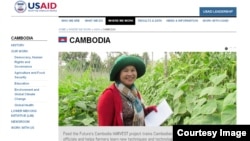While it is true that Cambodia has some women in politics and positions of leadership, a new report says they often lack true power.
According to the study, issued by USAID in December, women’s positions in leadership are more symbolic than substantive, and their political influence is limited.
The report, “Women’s Leadership as a Route to Greater Empowerment,” points out the main barriers to women’s empowerment in the country, including its electoral system, the patronage system, and social structures and culture.
Electoral reform and eradicating the patronage system, which requires “paying for higher-level positions in the party and government,” are key for improving women’s roles, the report says.
Mu Sochua, a lawmaker for the opposition Cambodia National Rescue Party, says empowerment will require even more than that.
“Under a non-proportional representation system, women candidates have to independently make their name well-known politically,” she said in an interview with VOA Khmer. “Actually, associating with renowned political parties under a proportional representation may significantly help women candidates get elected when the parties obtain majority votes.”
That means the fate of a woman’s political career is wrapped tightly in the success of her party. So parties should design affirmative action policies, to help with gender equality, she said.
USAID points out that women have little opportunity to gain political experience, and often women lack confidence and skills in leadership roles. Mu Sochua agreed.
“Very often women decide not to stand for office because they are not sure of their own ability and are hesitant to sacrifice their family roles for political life, and in this case, there is nothing to do with a political party,” she said.
Moreover, the report highlights key roles of civil society in promoting women’s leadership—preparing women with self-confidence, skills and knowledge in public speaking, electoral laws and policymaking, in addition to their lobbying work for gender-based policies.
Pung Chhiv Kek, director of the rights group Licadho, said in an interview that providing women with access to higher education and proper healthcare is the key to increasing the supply of women candidates.
“Support from men can help women become actively involved with leadership roles and political engagement,” she added. “I believe women can effectively solve social issues that affect women and children the most.”
There is hope for gradual change in the patriarchal social structures and culture, due to striving young Cambodians, the report says.
Leav Kimlay, head of the US Ambassador’s Youth Council, believes women leaders possess a great deal of potential in building strong institutions, creating economic opportunities, and, most importantly, tackling corruption.
“I strongly support women leaders,” he said. “Women can be as intelligent and strong as men, and their political leadership can shape institutional systems to become more transparent, to maintain peace and security, and help build strong healthcare systems and public service, because by nature, they are peaceful and connected to their significant others.”
He is concerned, however, that limited opportunities for women to attain higher education and gain experience in public engagement may continue to prevent women from reaching their leadership potential.
The report also suggests that even increasing symbolic representation of women’s political leadership may lead to greater empowerment.
Meas Chansatya, a member of the Ambassador’s Youth Council, however, said role models are important, but so is the lack of them. “Having many women leaders motivates me to become a leader too, but that is not always the case,” she said. “And I think it’s because of a lack of women leaders that I am strongly motivated to become a leader.”







